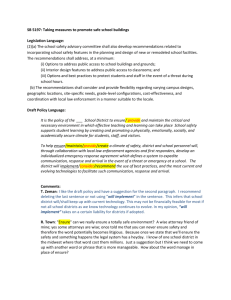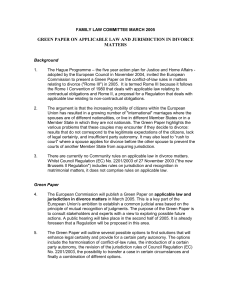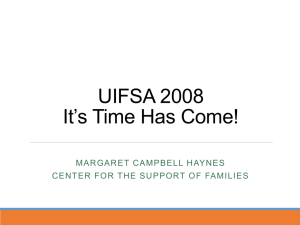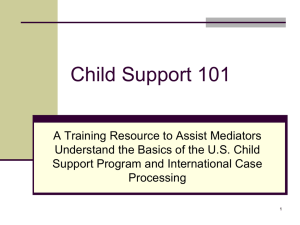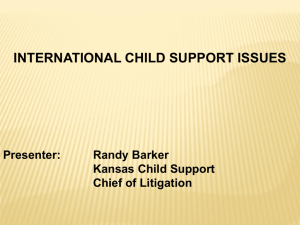Processing Amer-Asian Cases in the U.S. Today and After the 2007
advertisement
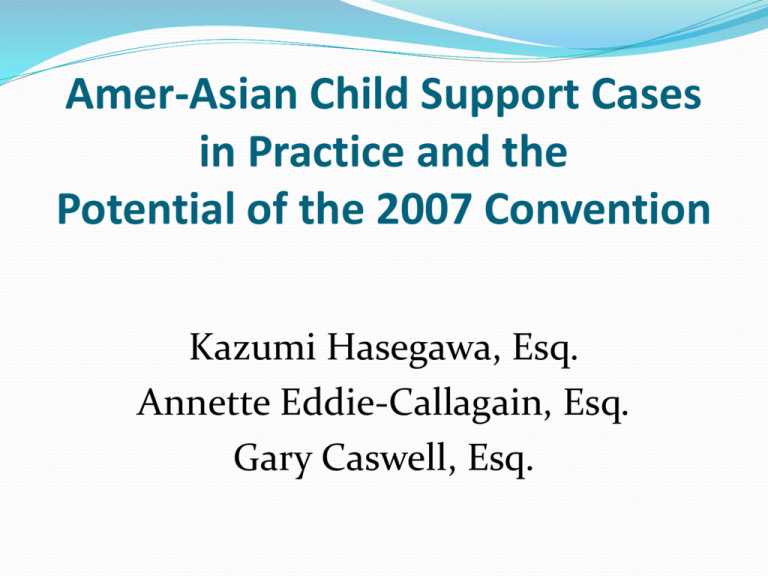
Amer-Asian Child Support Cases in Practice and the Potential of the 2007 Convention Kazumi Hasegawa, Esq. Annette Eddie-Callagain, Esq. Gary Caswell, Esq. Child Support in Japan Kazumi Hasegawa – Japan and USA Legal Basis for Child Support Statistics, Process, and Execution Recognition of Foreign Child Support Orders Practical Considerations Pertaining to the 2007 Convention Overview • Child Support: National Law – Not Individual Prefecture Law • Divorce, Separation, Parentage • Calculation and Duration of Support • Enforcement of Support; Garnishment of Wages Obligation to Pay Child Support • Prior to 2012, parents participating in uncontested divorce settlement should resolve the issue of child custody • Since 2012, parents participating in uncontested divorce settlement should also resolve child visitation and child support based on the best interest of the child (Civil Code 766; revised in 2011 and effective 4/2012). • No joint custody system in Japan and the non-custodial parent pays child support to custodial parent • Unmarried couple – acknowledgment of father in the family registry is required to obtain child support • • • Voluntary acknowledgment – Civil Code 779 Involuntary acknowledgment – Civil Code 787 Child support obligation from the birth – Civil Code 784 Statistics: Divorce Rates in Japan Ministry of Health Labor and Welfare Statistics: Divorce Rate in International Couples Ministry of Health Labor and Welfare Statistics: Ratio Between Marriage and Divorce Rates Process: Who comes for Child Support Consultation Women 78.8% Men 19.5% Organization 0.9% Unknown 0.8% Ministry of Health Labor and Welfare (4/2013 – 3/2014) Process: When Child Support Consultation Takes Place Prior to Divoce 36.7% Post Divorce 55.5% Unmarried 6.5% Other 0.9% Unknown 0.3% Ministry of Health Labor and Welfare (4/2013 – 3/2014) Process: Consultation Matter Process 29% Calculation 23% Default payment 12% Amount Reduction 8% Amount Increase 2% Garnishment 5% Visitation 9% Other 12% Ministry of Health Labor and Welfare (4/2013 – 3/2014) Single Family Homes and Receipt of Child Support Single Mother Household Single Father House Hold Child Support Arrangements 37.7% 17.5% Actual Receipt of Child Support 19.7% 4.1% (Based on: 2011 Survey on single families in Japan) Ministry of Health Labor and Welfare Effect of Amendment of Civil Code 766 (4/2012) Divorce cases with minor children (4/2012 – 3/2013) 131,2564 With Visitation Terms 72,770 (55%) With Child Support Terms 73,001 (56%) Ministry of Justice 2013 Process: Where to get help • Child Support Consultation Support Center (Sponsored by MHLW) • Legal Affairs Bureau – free legal clinics • Non- Profit Organizations • Bar Associations / Attorneys Child Support Obligation: • • • • Begins When the Custodial Parent First Requests it Retroactive only to Date of First Request In Parentage Case may be Retroactive to Date of Birth Frequency of payment: • • Periodic payment most common, i.e., monthly Lump Sum payments have been ordered in international cases where NCP is a foreigner Establishment: How Child Support Arrangement is Made The process depends on the type of divorce proceeding • Uncontested divorce – Civil Code 763 • • Notarized document Oral or written agreement • Conciliation Proceeding – Domestic Relations Case Procedure Act 268 / 284 (in effect 1/2013) • Trial (Civil Code 770) Duration and Calculation of Child Support • Duration: not established by law • • typically paid until the child reaches the age of majority (20 years old) unless otherwise agreed (e.g. through college, etc.) Calculation: • • Goal: Maintain same standard of living the child is accustomed to Based on matrix prepared by court • • Income of both parents Special circumstances (needs of child) Enforcement of Child Support • Conciliation Proceeding May be Utilized: • • • • To obtain enforcement when oral or written agreement of child support is not complied with To seek modification of amount of child support Notice of request for payment or Notice of order to pay child support Compulsory execution • • Court-Ordered Support Notarized Agreement to Pay Support Compulsory Execution • Pre-requisite: • • • • • Garnishment of wages Amount entitled to garnish • • • Notarized uncontested divorce agreement Conciliation Process Trial Prior to amended civil code (in effect 4/2004) Post amendment – applicable to all matter specified in Civil Execution Law 151(2)(1) How to terminate garnishment order • • Civil Execution Law 153 Defenses Defenses to Garnishment of Child Support • Child Support Obligor Loses Job/Ability to Work • Lump Sum Payment • Death of Obligor • may claim inheritance Recognition of Foreign Child Support Orders • Enforcement of foreign judicial order • • • Comity Fairness in outcome and procedure Effect of 2007 Hague Convention • • Avoid the trouble of dealing with different judicial process Recognition and enforcement of order 2007 Hague Convention Requires New Legislation to Implement More Streamlined Japanese Establishment, Enforcement and Modification Procedures Would be very helpful to Japanese Custodial Parents Applies to All U.S. States Good compliment to Hague Abduction Convention ESTABLISHING AND ENFORCING CROSS-BORDER CHILD SUPPORT OBLIGATIONS HHC Hague Conference on Private International Law E-C Gaikokuho Jimu Bengoshi Jimusho (E-C Law Center) E-C Law Center Bldg., Suite 1F 2-4-2 Isa, Ginowan City Okinawa, Japan 901-2221 PH: 81-98-898-0162 Fax: 81-98-899-2142 E-mail: bigfoot.account@gmail.com NOVEMBER 9 – 12, 2015 OVERVIEW OF THE PROGRAM • BACKGROUND OF CHILD SUPPORT ISSUES • JURISDICTIONAL CHALLENGES • PATERNITY CHALLENGES • NUTS AND BOLTS OF THE EXISTING PROGRAM • CHECK-CASHING CHALLENGES BACKGROUND OF CHILD SUPPORT ISSUES Number of International Children in Japan Fathers’ Location Unknown Paternity in Dispute Lack of Agreement Between Japan and U.S. May be Viewed as Lack of Jurisdiction U.S. Involvement – PIQ 99-01 JURISDICTIONAL CHALLENGES UIFSA APPLICATIONS VS. DIRECT APPLICATIONS UIFSA Under the Uniform Interstate Family Support Act, the obligee living in one state can establish or enforce a child support order against the obligor in another state or vice versa. Under UIFSA, a foreign country is considered to be a “State” only if it has enacted law and established procedures for issuance of support orders that are “substantially similar” to those under the UIFSA or URESA. Japan has not done so. POLICY INTERPRETATION QUESTION (PIQ) According to PIQ 99-01, from Judge Ross who was then with the Office of Child Support Enforcement, Washington, DC, States are required to provide child support enforcement services to individuals who reside in a foreign country and who apply directly to State for paternity or support enforcement services. Section 454(4)(A)(iii) of the Social Security Act imposes a literal requirement that State agencies must provide Title IV-D services to anyone who has filed a proper application for services with the agency. NEVADA The couple had been divorced in Japan, and a court order was obtained by the Petitioner, which ordered the Respondent to pay child support. This was an enforcement action only. The Respondent’s position was: 1. The Court should not enforce the foreign order 2. The way the foreign order was obtained was not proper 3. The Court should modify the foreign order HOLDING: The Court did have jurisdiction of the parties and subject matter of this case; that the Respondent personally appeared and participated in the Japanese proceeding (he was living in Japan at the time). After researching the law, the Hearing Master was not able to locate any authority for the Respondent’s argument. KENTUCKY: The Okinawan mother and the American father were never married; however, they are the parents of a son. The American father presently resides in the State of Kentucky where a child support case was filed (under UIFSA). The initial Petition was heard in Jefferson Family Court. The father denied paternity and a test was conducted, with the results as Positive. A court order was issued, ordering the father to pay child support. The father retained counsel and moved the court to dismiss the action on the grounds of lack of subject matter jurisdiction. The Respondent appealed to the Jefferson District Court, arguing that the Court lacked subject matter jurisdiction because the Petitioner (the mother) did not have standing, since the Mother of the subject child is a citizen of Japan, which is not a state within the meaning of the Statute in that it had not established reciprocal procedures for issuance of enforcement orders, which are substantially similar to procedures in the Commonwealth of Kentucky. The Jefferson County Circuit Court reversed the judgment and orders of the trial court, holding that the trial court did not have subject matter jurisdiction. The Commonwealth of Kentucky filed a Petition for discretionary review with the Kentucky Court of Appeals. The Appeals Court denied the Motion for discretionary review. The case was then sent to the appeals division to determine whether they could fashion an appropriate federal question which would allow the appeal to the U.S. Supreme Court; and, whether that office would prosecute that appeal. CALIFORNIA: An Okinawan mother and an American father registered a divorce by mutual agreement in Okinawa, which did not provide for the support of the children. The mother and the children reside in Okinawa and the father resides in California. A UIFSA Petition was filed, seeking the establishment of a child support order. The father contested subject matter jurisdiction and the trial court found that California lacked subject matter jurisdiction because the parents were divorced in Japan and the children continued to live there; also, California was a forum non conveniens. The Petition for child support was dismissed by the trial court. The Child Support Office appealed the judgment of dismissal, arguing that the court had proper subject matter jurisdiction to establish a child order in any case where the obligor resides in California, regardless of the presence or residence of the obligee; and California is the convenient forum for such a determination because the Respondent and his financial information were located there and enforcement of any order for support will be in California; and, if California did not enter the Order, the children would not have the benefit of support from their father. The California Court of Appeals reversed the Judgment of Dismissal, and declined to interpret the terms of UIFSA because both parties agree that UIFSA is inapplicable to the facts before the Court. The Court did hold that the Superior Court in California has exclusive jurisdiction over all proceedings under the Family Code. Although the divorce decree was issued in Japan, there is no indication that it has personal jurisdiction over the husband to enforce a support order; nor is there any indication that the husband will voluntarily submit to jurisdiction in Japan. The Court went on to state that the County may properly proceed against the husband in Ventura County Superior Court. Regarding the allegation of the Husband that California Courts was not a convenient forum, the Appellate Court held that the husband erred in his allegation that Japan is a suitable alternative forum in that the husband had not submitted to jurisdiction in Japan, and does not appear to be amenable to the process there. And, should he insist that a support order may only be issued by a Japanese Court, he is free to submit to jurisdiction in Japan and litigate the matter there. It was determined that the parents of a minor child have an equal responsibility to support their children, and that a father who is a California resident has a duty to support his children, regardless of the presence or residence of his wife. Further, the Court found that California had subject matter jurisdiction. Regarding the issue of non conveniens, Japan is not a more suitable forum because litigation in either country would require translation of documents, conversion of yen/dollars, and discovery in either would be cumbersome. The Husband filed a Petition for a Rehearing which was denied. MICHIGAN Conceded that the interpretation of Direct Application for Title IV-D Services from International Residents [OCSE-PIQ-99-01] is correct, and a direct application to Michigan is proper. However, the custodial parent (CP) must consider: 1. CP must attend an interview in person; 2. CP must attend court proceedings, in person; 3. If an order is obtained in Michigan, then the courts will have continuing jurisdiction over custody and visitation; 4. CP could file in home country which would initiate an interstate action to Michigan; their home country would then retain jurisdiction over custody and visitation; 5. When applying directly to Michigan, the County Prosecutor or Friend of Court can exercise their professional legal judgment and prosecutorial discretion in accepting or refusing to file a case. (The state of Michigan does not have reciprocity for child support purposes with either the Nation of Japan or the regional government of Okinawa. If international reciprocity were established, we would be able to assist you.) PUERTO RICO “Japan has no reciprocity with Puerto Rico, which is a requisite in our Law. This precludes us from providing the service that you are requesting for your client. The only way we could assist her would be that an Attorney in Puerto Rico represent her.” PATERNITY CHALLENGES (PATERNITY IN DISPUTE) 1. DENIAL BY THE ALLEGED FATHER 2. DIFFERENT GEOGRAPHICAL LOCATION 3. COST OF DNA TESTING IN JAPAN NUTS AND BOLTS OF PROGRAM CONTACTS FOR CHILD SUPPORT ASSISTANCE 1997 1998 1999 2000 2001 2002 2003 2004 2005 2006 01 03 17 45 47 36 30 37 07 08 2007 2008 2009 2010 2011 2012 2013 2014 2015 07 15 10 04 08 06 03 09 08 TOTAL CONTACTS FROM 1997 TO 2015: 254 LOCATION OF MOTHERS JAPAN Aichi Awamori Fukuoka Fussa Gifu Hiroshima Hyogo Ibaragi Iwate Kagoshima Kanagawa 240 2 2 4 5 1 1 2 1 1 1 6 Kochi Kumamoto Nagano Nagasaki OKINAWA Osaka Saitama Tokyo Yamaguchi Yamanashi KOREA PHILIPPINES THAILAND 2 1 1 3 173 3 2 17 6 6 5 6 3 LOCATION OF FATHERS OKINAWA 45 MAINLAND JAPAN 23 UNITED STATES 182 SINGAPORE 1 EUROPE 2 KOREA 1 TOTAL: 254 CHILD SUPPORT COLLECTED VOLUNTARY PAYMENTS PER MONTH 56 CASES $24,879.30 Monthly Collections CHILD SUPPORT COLLECTED INVOLUNTARY PAYMENTS PER MONTH INVOLUNTARY PAYMENTS 103 CASES $81,059.90 MONTHLY COLLECTIONS TOTAL CHILD SUPPORT COLLECTED VOLUNTARY AND INVOLUNTARY COLLECTIONS TOTAL PAYMENTS PER MONTH $105,938.20 TOTAL PAYMENTS PER YEAR $1,271,258.40 ARREARAGES: $497,305.71 COOPERATING STATES ALASKA ALABAMA ARIZONA ARKANSAS CALIFORNIA COLORADO DELAWARE FLORIDA GEORGIA HAWAII ILLINOIS INDIANA KENTUCKY LOUISIANA MARYLAND MAINE MICHIGAN MISSOURI TOTAL 36 MONTANA NORTH CAROLINA NEVADA NEW MEXICO NEW YORK NORTH CAROLINA OHIO OKLAHOMA PENNSYLVANIA PUERTO RICO SOUTH CAROLINA SOUTH DAKOTA TENNESSEE TEXAS UTAH VIRGINIA WEST VIRGINIA WISCONSIN WYOMING OTHER ASSISTANCE PROVIDED (INTEGRATED INTO THE CHILD SUPPORT PROGRAM) LOCATE ABSENT FATHERS (175) PSYCHOLOGICAL/PSYCHIATRIC COUNSELING DNA COLLECTION JOB TRAINING SHELTER – SHORT AND LONG TERM CASHING CHILD SUPPORT CHECKS DNA TESTS RESULTS POSITIVE RESULTS 73 NEGATIVE 4 PENDING 0 TOTAL CASES INVOLVED: 77 THANK YOU! ON BEHALF OF THE WOMEN AND CHILDREN Processing Amer-Asian Cases Gary Caswell – USA, International Processing Amer-Asian cases in the U.S. Today U.S Child Support Program Overview UIFSA 2008, Federal Regulations and IV-D Policy 2007 Convention Impact on the Recovery of Child Support and Other Forms of Family Maintenance U.S. Child Support Program Social Security Act, Title IV-D OCSE www.acf.hhs.gov/programs/css 50 States + Guam, Puerto Rico, U.S. Virgin Islands & Washington D.C. Federal Funding - Law/Regulations/Policy 15.1 Million Cases (FY 2014) 28.2 Billion Dollars Collected (FY 2014) State Disbursement Unit (SDU) 1 per State U.S. Interstate Cases 1,037,644 Interstate Cases (FY 2014) Texas sent 44,280 , received 68,381 Total number of collections sent to other U.S. states: $1,572,574,644 Texas sent $ 126,834,421 to other U.S. States Reported International Cases -2014 U.S. – Foreign Countries: 4,232 Foreign Countries – U.S. : 9,207 Total Reported 2014: 13,439 $ from Foreign Countries to U.S. : 5.2 M $ U.S. to Foreign Countries : 15.3 M Total Reported 2013: 20.5 M Legal Basis Multi-national Conventions (2007 only) Federal Declared Foreign Reciprocating County State Level (Political Subdivision) Arrangements Parallel Unilateral Policy Declarations Comity Processing International Cases IV-D Services = PIQ-99-01 = “Anybody Anywhere “ Establishment of Paternity and/or Child Support for anybody/anywhere. Use OCSE Forms Enforcement of Foreign Order if Foreign Country meets definition of “State” FRC, SRC, Sub Sim Law/Proc = Order is Registered Comity – Local law to recognize and enforce Physical Presence of Non-Resident not Required Telephonic Testimony UIFSA 2001 Registration Transmittal Letter Two copies of order, incl. one certified copy Sworn Statement of Arrears by Creditor or Copy of Payment Record Certified by Custodian of Record Obligor Name, Location and Employer Information Obligee Name and where to send payments If multiple orders, copies of all for determination of controlling order Notice of Registration sent to Obligor Contest must be filed within 20 days Registration Confirmed or Vacated UIFSA 2008 http://uniformlaws.org/Act.aspx?title=Interstate%20F amily%20Support%20Act%20Amendments%20%2820 08%29 In the Process of Being Enacted by All U.S. States Law and Procedures for Processing International Cases Continuing Exclusive Jurisdiction - Controlling Order Article 7 for Processing 2007 Convention Cases Articles 1-6 for Processing Interstate and Other International Cases UIFSA “Foreign Country” § 102 (5) Country which: (A) Federally Declared Foreign Reciprocating Country (B) Individual U.S. State Reciprocity Arrangement (C) Enacted a Law or Procedures Substantially Similar to UIFSA Procedures (D) 2007 Convention is in Force with Respect to the U.S. ** Japan, China, etc. are Not Foreign Countries!!! Foreign Country Cases IV-D Support Enforcement Agency will work case for free (Location, Establishment, Enforcement, Modify) Foreign Support Orders from FRCs, SRCs, Sub Stan Similar Law/Procedure Countries Registered and worked per Ch 1-6 Convention Country Cases worked per Ch 7 States may require individuals in Foreign Countries to apply through own support agency U.S. Implementing Legislation Preventing Sex Trafficking and Strengthening Families Act, 128 Stat. 1919; 43 USC 1305. Requires US States to Enact UIFSA 2008 UIFSA 2008 Gives State IV-D Support Enforcement Agencies Options of Only accepting applications from Foreign Countries and Requiring Individuals in Foreign Countries to apply through their own agency OCSE allows, but does not require IV-D agencies to provide “anybody, anywhere” IV-D Services UIFSA 2008 Ch.7 Registration Transmittal Letter Complete text of order [or abstract by issuing foreign tribunal] Record that order is enforceable in issuing country If default order, a record attesting to due process re: notice & opportunity to be heard Records re: arrears, automatic adjustment of support, receipt of free legal assistance in issuing country Tribunal can vacate if manifestly incompatible with public policy. Notice of Registration – 30 days to contest (60 if Respondent is NR) Registered Order is Enforceable Defenses to Enforcement Recognition and enforcement of order is manifestly incompatible with public policy, including failure of issuing tribunal to observe minimum standards of due process; Issuing tribunal lacked personal jurisdiction consistent with Section 201; Order is not enforceable in issuing country; If default order, there was a lack of due process re: notice & opportunity to be heard Duty to Establish Order If Foreign Order cannot be recognized for: Lack of personal jurisdiction Procedural fraud A proceeding between same parties in other state pending and filed first Default order violates due process Then the tribunal may not dismiss the proceeding without allowing a reasonable time for a party to request the establishment of a new Convention support order. New Policy Impact on U.S. Negative Not allowing Anybody/Anywhere to be entitled to IV-D agency assistance suddenly provides debtors a potential U.S. sanctuary from supporting innocent children Denies equal protection under the law to U.S. citizens working abroad Discriminates against U.S. Taxpayor Creditors abroad whose taxes paid to the I.R.S. help fund the IV-D Program Positive Allows States option to use the program fairly to Direct Applicants and Direct Requestors UIFSA 2007 Impact on U.S. • Policy or Law? • Shrinks the Universe of Children who benefit from the law • Applications from Creditors from “Non” Foreign Countries may be refused by IV-D agency • Applicants making Direct Requests to Establish or to Recognize and Enforce a Convention Support Order not entitled to IV-D assistance Allows states to force direct requestors to use inefficient Central Authorities 2007 Convention Impact on U.S. • Immediate Increase in Number of Countries Providing Child Support services to U.S. creditors • Focus on value of administrative cooperation and accountability • Recognition of how model forms and abstracts can save costs of translation • Recognition of need for expeditious and cost-effective transfer of funds Interesting Cases 1) Creditor in U.S./Debtor in Asian Country (no FRC, SRC, or PUPD 2) A) Creditor in Non-FRC, SRC, PUPD Country / Debtor in U.S. State “A” - Enforcement Denied (not a “state”; AND violates Public Policy and Due Process) B) LATER country becomes a FRC and tries to register and enforce SAME ORDER in States “B” AND then “C”!!!!! 謝謝 ありがとうございました Thank You
